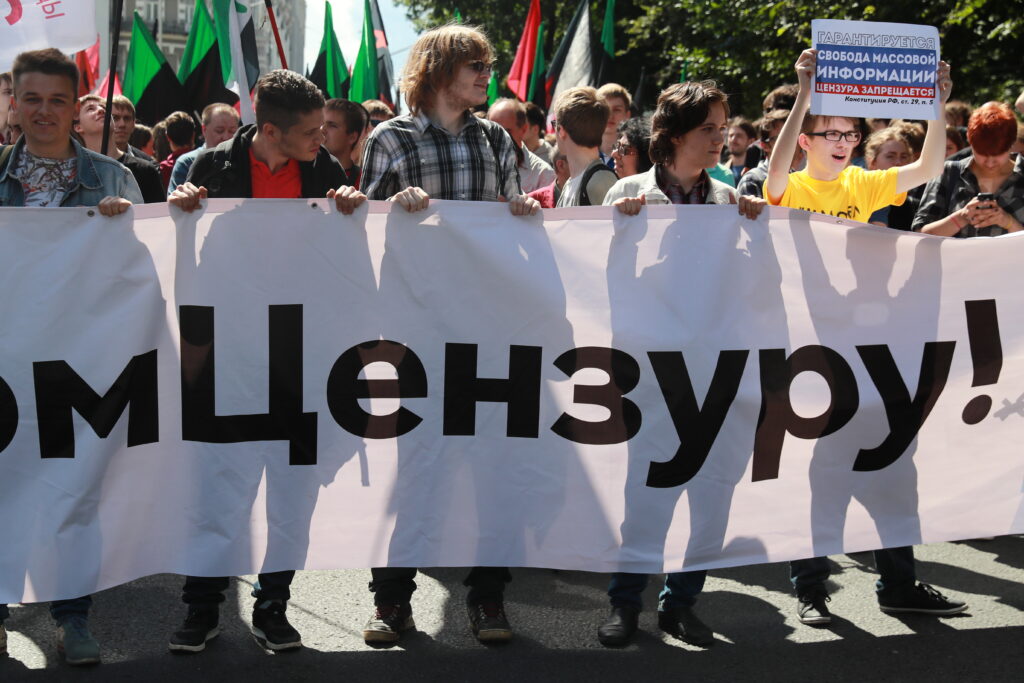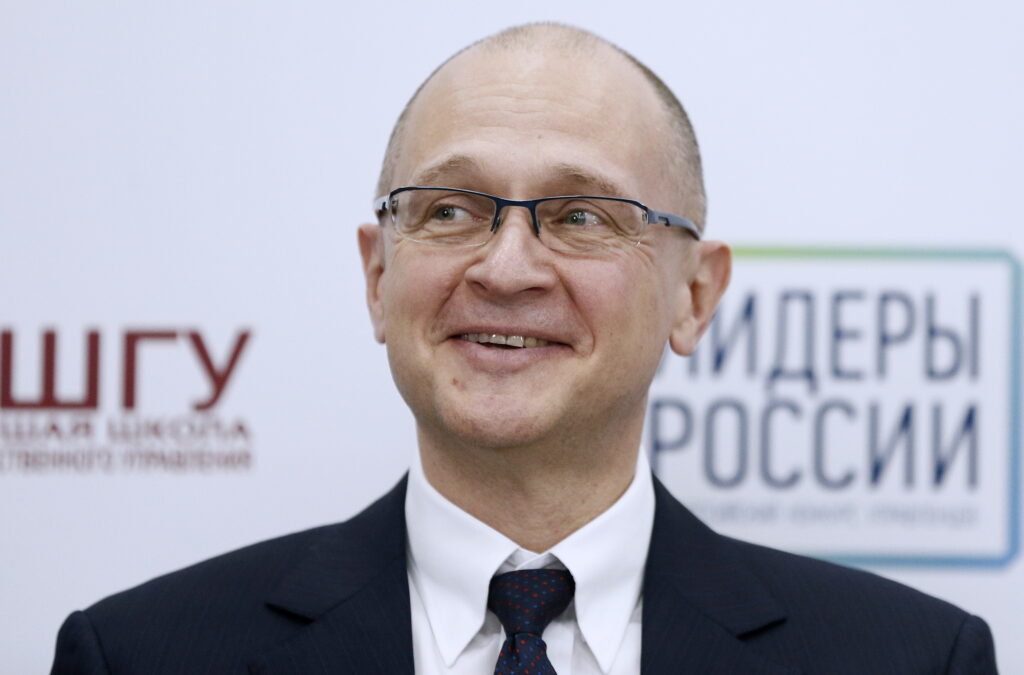— And we seem to be fighting it but the results are negligible. And results in this case mean jail. So where are the imprisonments?
Vladimir Putin at a meeting of the Presidium of the Government on smuggling
Our subsequent summary report published in February 2015 indicates a sharp increase in the number of sentences for online activity: at least 18 people were sentenced to between several months and 5 years in prison, and three more individuals were put under compulsory medical treatment. We suggested that this was only the beginning, and that prison sentences for reposts and «likes» would only be an expanding practice.
This is indeed what happened: our monitoring of the restrictions imposed on the freedom of Internet use in Russia last year revealed as many as 29 prison sentences and 3 cases of compulsory treatment in a mental hospital.
Igor Stenin, the leader of the informal «The Russians of Astrakhan» movement, posted a comment on the VKontakte social network in support of Ukraine and was sentenced to 2 years of imprisonment for making public calls to extremist activity. His case file includes a repost of a short article about the situation in eastern Ukraine, written by a participant of the Anti-Terrorist Operation (ATO), which was posted as a comment by another VK user. The technical progress is evident: in the past, agents used to slip drugs or bullets into detainees’ belongings, whereas now they slip commentaries and screenshots.
Yevgeny Kort, a resident of Zelenograd, who shared a collage depicting previously-convicted neo-Nazi Maxim Martsinkevich and «a man dressed like Alexander Pushkin», could have ended up in a penal settlement for a year based on the decision of a court of first instance, had it not been for an appeal in a Moscow city court which decided to replace his prison term with a fine of 200,000 rubles.
The criminal case of Yevgeniya Chudnovets, who worked in a kindergarten in the small town of Katuysk, in the Kurgan Oblast, attracted wide publicity when holiday camp workers there were accused of sexually abusing a 9-year-old in the summer of 2016.
The situation caught the eye of the authorities after a 3-second-long video was published in Chudnovets’ closed VKontakte group. The video showed a child with his pants down. Chudnovets had come across the video on the page of an acquaintance of hers and reposted it within her own group in order to express her indignation at what was happening at the holiday camp. Subsequently, Chudnovets gave detailed testimony about the camp’s workers, and thought the story was over. However, a police officer who had accessed the VKontakte closed group using an alias had saved screenshots of the page and kept them for half a year. When the time was ripe, he dug out the screenshots and wrote a report. Based on this, a case was brought against Chudnovets on the distribution of child pornography. She was convicted and sent to a penal colony for 6 months. It is noteworthy that the person who had filmed the allegedly pornographic video and uploaded it to the Internet was a witness in the case, and even took the floor at Chudnovets’ trial.
This story of a young mother (Chudnovets has a three-year-old-son) sentenced for trying to draw attention to what was going on at the holiday camp stirred up society. During her imprisonment, she was put in solitary confinement for writing a line from a nursery rhyme on the wall of the prison yard. The overall expectation was that Chudnovets would be released on appeal after even the prosecutor’s office called the verdict unfair and cruel. Eventually, the regional court reduced her sentence to one month.
Then there was Alexey Kungurov, a Tyumen blogger who was sentenced to 2 years for «public justification of terrorism». He had published a post entitled «Who are Putin’s falcons actually bombing?» which criticized the actions of the Russian air force in Syria, and discussed ISIS-related issues.
In contrast, another well-known blogger, Anton Nosik, expressed outright support for this military operation. Nosik wrote «Vladimir Vladimirovich, wipe Syria off the face of the earth (…) don’t be shy, use blanket air strikes, be my guest». And despite clearly blatant trolling by the authorities, Nosik was accused of inciting inter-ethnic hatred and fined 300,000 rubles.
After Russia joined the Syrian military conflict in September 2015 on the side of Bashar al-Assad, the number of criminal cases on grounds of calls to terrorism or justification of terrorism increased. The relevant article (205.2) was included in the Criminal Code back in 2006. However, it was rarely applied in those days, at least as regards the Internet (for example, 12 sentences were passed in 2012 and as many as 34 in 2015). In 2016, we were able to track 7 criminal cases (of a larger number) on grounds of justification of terrorism on the Internet. In 5 of these, including the case of Kungurov, the accused were indeed sentenced and in 4 cases received from 2 to 5 years.
Against this backdrop, the case of Ramil Ibragimov, a youth activist from Tatarstan, particularly stands out. Ibragimov became emotional in his praise of the killing of patrons at a gay nightclub in Orlando, June 2016, by «a straight Afghan fella», and regretted that there were too few victims. Ibragimov, the head of the pro-governmental Union of Young Innovation Leaders, got away with a fine of 50,000 rubles and was not even included on the list of terrorists and extremists whose bank accounts are frozen and all financial operations blocked by Rosfinmonitoring (the Federal Financial Monitoring Service of the Russian Federation), as usually happens in such cases.
The latest addition to the Criminal Code — Article 280.1 (calls for the violation of the territorial integrity of the Russian Federation) was introduced on May 9, 2014, on Victory Day just a few weeks after the «return» of Crimea to the Russian Federation. Of 15 known cases pending at the moment, 8 had to do precisely with Crimea, Siberia and the Urals, unified Mongolia, Chechnya, the Komi Republic, Kuban and the Kaliningrad Oblast.
The article was amended shortly after its entry into force: the maximum sentence was extended from three to four years, which meant that such offences were classified as crimes of medium gravity. This means that the statute of limitation was extended, that the accused can be detained before trial and that deprivation of liberty is more willingly administered.
For instance, Tatar nationalist Rafis Kashapov, currently serving 3 years for writing several articles on solidarity with the Crimean Tatars, was found guilty on charges that materials published by him formed «a negative attitude to the actions of the Russian Federation in Crimea in 2014… by stating that the „occupation“ of Crimea and the violation of the norms of international law constituted an aggressive policy». This did not prevent the court from sentencing Kashapov, an elderly man, to long-term imprisonment.
Activist Darya Poluydova from Kuban and Andrey Bubeev, an engineer-electrician from Tver, are still serving their sentences in penal colonies. All in all, 6 people have been convicted based on Art. 280.1. One of these — Chelyabinsk activist Alexey Moroshkin, accused of intention to create the Ural Republic — ended up in a mental hospital.
On the one hand, the ongoing practice of depriving those convicted of their freedom in previous years gave law enforcement agencies a very convincing argument in «bargaining» with the accused, while persuading them to plead guilty or refrain from the appeal. On the other hand, officers received a clear message: «Yes, we can!» Yes, you can send people to a penal colony for years for reposting a demotivational poster or a joke, and the verdict will not be repealed upon appeal. You can add bloggers critical of the annexation of Crimea to terrorist lists even before the case is referred to the courts. Journalists investigating corruption cases can be kept in pre-trial detention facilities for years.
So far, every jail sentence of the kind has caused shock. However, public attitude is prone to change. Fatigue, apathy and acceptance develop.
When musician Savva Terentyev, from the city of Syktyvkar, received a year in suspension for a commentary on LiveJournal in which he proposed «to burn the infidel cops in the square» in 2008, his case seemed to be a bad dream. In those days, RuNet used to be one of the freest and safest places on earth — or so it seemed at the time.
But a few years have passed since then, and sanctions against extremist activities on the Internet have become tougher, under the pretext of combating terrorism. Requirements for proof of guilt have become weaker, while the number of criminal cases for statements made on the web has grown exponentially.
Once upon a time, an acquittal in a political case seemed quite a real and attainable result of professional work by a competent defense lawyer. A few years ago, punishment other than the deprivation of liberty was analogous to an acquittal. But now, lawyers known to AGORA confess that they have to fight for short sentences at most, for a penal colony instead of a regular prison, or for additional punishments not to be added as «supplements» to the sentence. The latest trend is to «follow» political prisoners in a penal colony, regularly placing them in solitary confinement or punishment cells, and applying strict conditions on their detention, etc. Moreover, changes in their conditions can be made with transfers from regular penal colonies to those with much stricter regimes. This is what happened, for example, to Andrey Bubeev and Igor Stenin.
The practice of criminal prosecution for the incitement of hatred against social groups such as «representatives of the authorities» and «police officers», etc., has also recently been resumed. Similarly to the late 2000s, any criticism of the authorities today is once again perceived as incitement of social enmity, and can provoke the respective reaction. The only difference lies in the fact that the level of strictness of the system is far more advanced, and that the prospects of ending up behind bars are very real.
The leader of the Tatar Patriotic Front «Altyn Urda» is currently being tried in Tatarstan. Danis Safargali is accused of extremism for posting about the «negative characteristics of social groups such as the President of the Russian Federation, the authorities of the Russian Federation and the media».
Yevgeny Domozhirov, a Vologda opposition activist representing the «Party of Progress», is charged with dishonoring the «police officers» social group. After the police searched his house and beat his mother up, a criminal case was brought against her for insulting the police officers. Domozhirov then published a huge post on his site asking a rhetorical question: «What next, respectable gentlemen-policemen, prosecutors and other law enforcement staff turning into fascist policemen? Are you going to go any further down the drain? Maybe the arrests of children, deportations or executions with no right of appeal will come next?»
An investigation into a criminal case against Alexander Gozenko, a resident of Saratov was completed last week. He has been charged with incitement of hatred and dishonoring social groups such as «The Patriots of Russia» and «Vatniki» (i.e. Russian jingoists). The proposal to «arrange the Holocaust of the Vatniki» was qualified by the investigation as a call to violence. It turns out that the list of vulnerable groups in need of special protection includes patriotically-minded citizens along with the president, policemen and other representatives of the authorities.
It is beyond doubt that the number of criminal cases against Internet users will continue to rise in the near future, together with the increasing toughness of the sentences. This will happen against the backdrop of the Russian authorities’ desire to isolate RuNet from the global web, which is currently manifested by the blocking of thousands of websites, amongst other measures.










